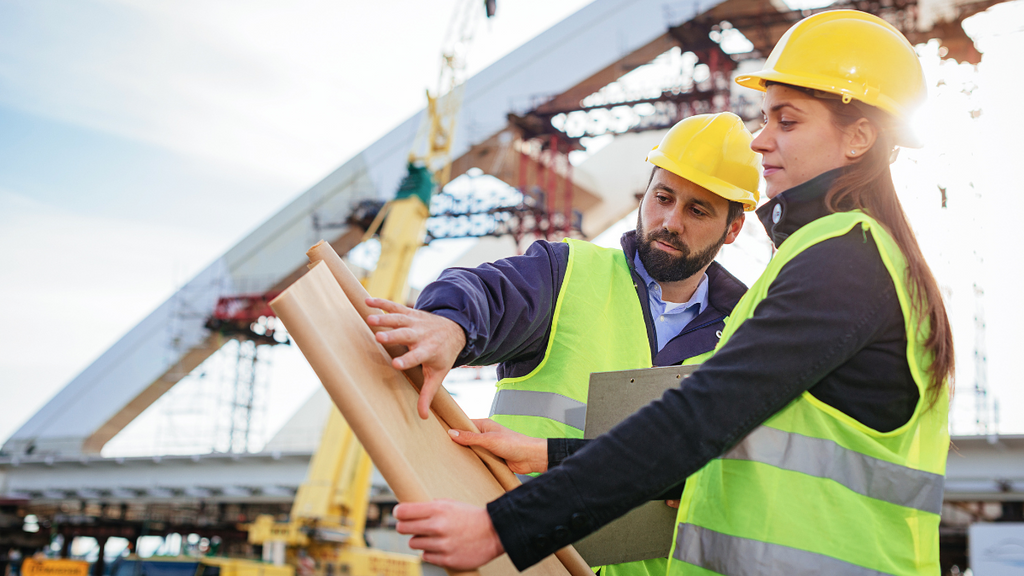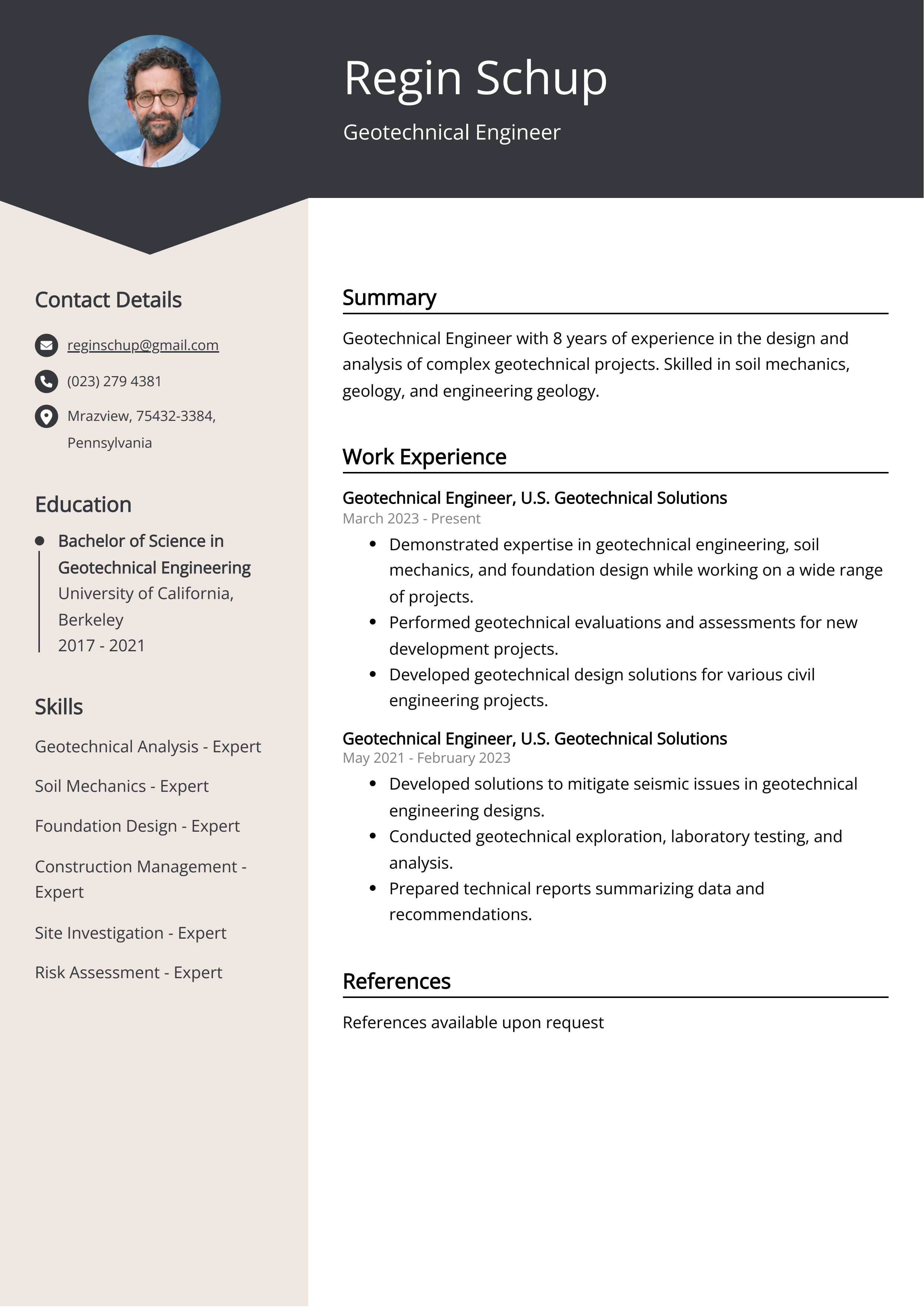More About Geotheta
More About Geotheta
Blog Article
Getting The Geotheta To Work
Table of ContentsUnknown Facts About GeothetaEverything about GeothetaThe Ultimate Guide To GeothetaA Biased View of GeothetaSome Known Details About Geotheta

They perform site examinations, gather examples, execute laboratory tests, and examine information to evaluate the suitability of the ground for building tasks - Engineer of Record. Based on their findings, geotechnical engineers supply referrals for structure design, incline stability, keeping structures, and reduction of geotechnical dangers. They work together with various other specialists, such as engineers, architectural engineers, and building and construction groups, to ensure that geotechnical factors to consider are incorporated into the general job layout and implementation
By analyzing the habits and properties of soil and rock, they can recognize possible geotechnical hazards such as landslides, dirt negotiation, or slope instability. Their expertise assists stop failures or mishaps that could threaten lives and property. Below are some detailed responsibilities and duties of a geotechnical designer: Site Investigation: Geotechnical designers conduct site examinations to gather information on subsurface problems.
They analyze the data to recognize the buildings and habits of the dirt and rock, including their stamina, leaks in the structure, compaction attributes, and groundwater problems. Geotechnical Analysis and Design: Geotechnical designers assess the data accumulated during website investigations to analyze the security and viability of the site for construction projects. They perform geotechnical calculations and modeling to assess factors such as birthing ability, settlement, incline security, side planet stress, and groundwater circulation.
Excitement About Geotheta
Structure Layout: Geotechnical engineers play a crucial duty in making foundations that can safely support the desired structure. They evaluate the soil conditions and tons demands to establish the proper structure kind, such as shallow structures (e.g., grounds), deep foundations (e.g (https://geotheta.blog.ss-blog.jp/2024-08-02?1722614750)., heaps), or specialized strategies like soil improvement. They consider factors such as negotiation limitations, bearing capacity, and soil-structure interaction to establish ideal foundation designs
They examine building and construction plans, display site activities, and conduct area assessments to confirm that the layout referrals are adhered to. If unpredicted geotechnical concerns emerge, they assess the scenario and give referrals for remediation or changes to the style. Danger Evaluation and Mitigation: Geotechnical engineers assess geotechnical dangers and dangers related to the job website, such as landslides, liquefaction, or soil erosion.

Collaboration and Communication: Geotechnical engineers function carefully with various other experts associated with a task, such as engineers, structural engineers, and building and construction groups. Reliable communication and partnership are important to integrate geotechnical considerations into the general project layout and building and construction process. Geotechnical engineers supply technological knowledge, solution inquiries, and ensure that geotechnical needs are fulfilled.
All about Geotheta
Below are some sorts of geotechnical designers: Structure Designer: Foundation engineers specialize in designing and evaluating foundations for frameworks. They evaluate the soil conditions, tons requirements, and website attributes to identify the most suitable foundation type and style, such as superficial foundations, deep foundations, or specialized strategies like pile structures.
They evaluate the factors affecting slope security, such as soil properties, groundwater problems, and incline geometry, and establish methods to stop incline failures and mitigate threats. Earthquake Engineer: Quake designers focus on evaluating and developing frameworks to hold up against seismic forces. They examine the seismic threat of a website, review soil liquefaction possibility, and create seismic layout standards to make sure the security and resilience of frameworks during quakes.
They execute field testing, accumulate samples, and examine the gathered information to define the soil homes, geologic formations, and groundwater problems at a site. Geotechnical Instrumentation Engineer: Geotechnical instrumentation engineers focus on surveillance and measuring the behavior of dirt, rock, and structures. They install and keep instrumentation systems that monitor variables such as soil settlement, groundwater levels, slope activities, and structural displacements to analyze efficiency and offer early warnings of possible problems.
How Geotheta can Save You Time, Stress, and Money.
They conduct tests such as triaxial tests, combination tests, direct shear examinations, and permeability examinations to collect information for geotechnical analysis and style. Geosynthetics Designer: Geosynthetics designers focus on the layout and application of geosynthetic materials, such as geotextiles, geogrids, and geomembranes. They use these products to enhance dirt stability, strengthen slopes, supply water drainage solutions, and control erosion.
They tend to be investigatory individuals, which means they're view intellectual, introspective, and curious. They are interested, systematic, rational, logical, and sensible. Some of them are also social, indicating they're kind, generous, cooperative, individual, caring, useful, understanding, sensible, and friendly - Geotechnical Engineers.
In the workplace environment, geotechnical designers utilize specialized software program tools to execute estimations, develop styles, and evaluate data. They prepare records, evaluation job specifications, interact with clients and staff member, and coordinate job tasks. The office setting gives a helpful atmosphere for research study, evaluation, and collaboration with various other specialists associated with the job.
The Ultimate Guide To Geotheta
They often see task websites to conduct website examinations, evaluate geotechnical problems, and gather data for analysis. These check outs include taking a trip to various places, often in remote or challenging terrains. Geotechnical engineers may execute soil sampling, conduct tests, and monitor building tasks to guarantee that the geotechnical aspects of the task are being applied properly.
Geotechnical designers additionally work in specialized geotechnical laboratories. Geotechnical lab engineers function thoroughly in these settings, handling testing equipment, operating instruments, and recording data.
Report this page